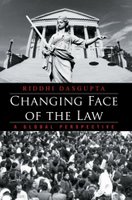Interview: Riddhi Dasgupta & Changing Face of the Law
Today, we’re profiling Riddhi Dasgupta, a 3rd year undergraduate at Columbia studying Operations Research, History, and Economics. Rid has recently written and published Changing Face of the Law: A Global Perspective, a book highlighting legal changes in this globalized millenium. Dasgupta’s book is available at Borders, Barnes & Noble, and Amazon.com.
 What made you decide to write Changing Face of the Law?
What made you decide to write Changing Face of the Law?Since a young age, I've been fascinated by the rule of law in every sphere, be that the legality of player-trading in this country or the courts/arbiters discussing issues like eminent domain. I divined it to be common sense that if the Law is around to solve the problems of our world here, now and for the future, it must be attuned to those realities. Can't really afford to live in a vacuum.
What's this book about?
I hope that the reader of Changing Face of the Law: A Global Perspective comes away feeling impassioned for what good legal globalization can bring. And how we should guard against the negatives.
I advocate 3 central ideas: (1) In the spirit of cautious globalization, the Law can no longer remain within the four corners of one country. It must expand its horizons to traditions and strategies beyond its own political borders. (2) Learn from other disciplines since it cannot survive in any vacuum. (3) Develop the Law by channeling a provocative discourse among society's various socioeconomic strata or groups. The book engages in something of an exhaustive ('enjoyable' too?) discussion of the US, India, and British commonwealth legal systems.
I definitely enjoyed experimenting with many different aspects of Law, for instance — drawing step-by-step analogies from technology & the rational unified process (RUP) or sports. Since this book is, one can hope, intended to develop the Common Person's appreciation of the rule of law, I wanted to include things from the real world.
You're under 21, yet you've written a 700+ page book. How did this book end up becoming a tome? (You're under 21, right?)
A few months short of 21, actually.
There are a lot of complexities in the world and the Law has got to be conscious of that. Can't evade the broad picture or the details. You try to stop one war and ten start; try to reallocate legal shareholder power and corruption sinks into the process. Capturing some of these variables, the book became a "tome." It occurred to me that if Holmes could revel in Law-Economics analogies (e.g., marketplace of ideas in Abrams v. United States (1919)), it behooved us in this generation to give it a concrete shape with respect to legal globalization. That face to globalization is a partner to its economic complement. We keep on talking about globalization as if the reforms will be self-effectuating. That, of course, is an illusion.
Globalization can elevate the quality of life of persons in the most remote places (as well as in the most accessible urban areas) only if the Law's informed dialogues and enforcements are vigilant. Why should people care that human dignity has a face in a "globalized" world? Should the Law's substance yield to rituals that leave victimized individuals or groups, whether in tort or human rights, "stateless"? The Law, whether in the east or the west, must be a genuine partner in convincing even the most disinterested people. Eloquent discourses will get the ball rolling. But it will take substantive changes. It may take time, but what choice do we have? Important to start discussing these ideas, I figured.
You're more interested by, concerned with, and focused on the law than most law school students whom I know — why are you so interested in the law? When and how did you develop this intense legal focus?
Can't really specify any particular day that I had a revelation! …but I've never looked at the Law just as a narrow opportunity. It's always been a way of life, a way of thinking.
Having lived in India for 12 years and then here for the last 9, I've developed something of a comparative perspective. I've seen what the Law, if it's substantive and tries to remove corruption, can stake out to accomplish. If there's education and infrastructure to reach those who need it most, perhaps relative poverty will still remain — but the quality of life can be uplifted. Before law school, I'd probably enjoy studying at LSE or some other institution abroad for a Masters, but we don't have to decide that right now. The Law as a profession seems to be the most effective way to channel that energy. I try to get as much exposure to different things, from interning in Congress – both Republicans and Democrats – to working in finance or IT. In college, apart from History, I chose to study Econ & Operations Research (something along the lines of Financial Engineering), so that there would be some technical exposure. Friends with different interests helped broaden this outlook.
Labels: CLS

4 Comments:
Riddhi's book is fascinating to read. It clarifies our insights to how the laws are across different countries and cultures across the globe. In his book he has shown repeatedly on how universal some of the laws are - and yet how there are subtle yet profound differences across nations.
Solid book. Great interview.
A promising book from a promising lawyer.
Way to go Riddhi! Keep it up! Just hit up my study break when you get a chance man!
Post a Comment
<< Home